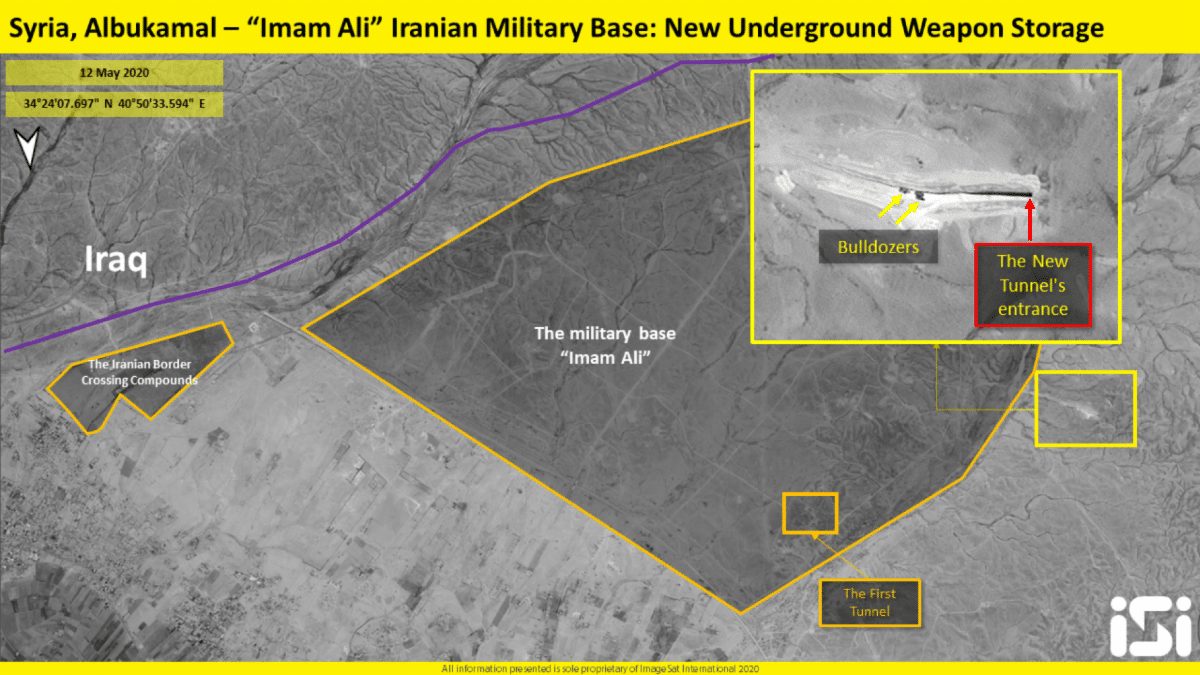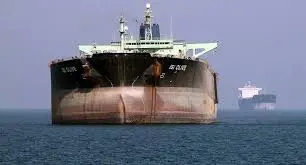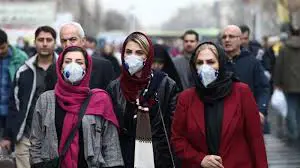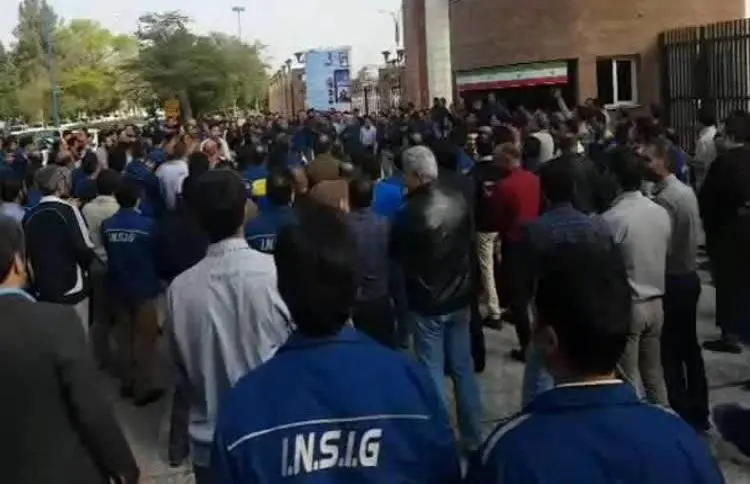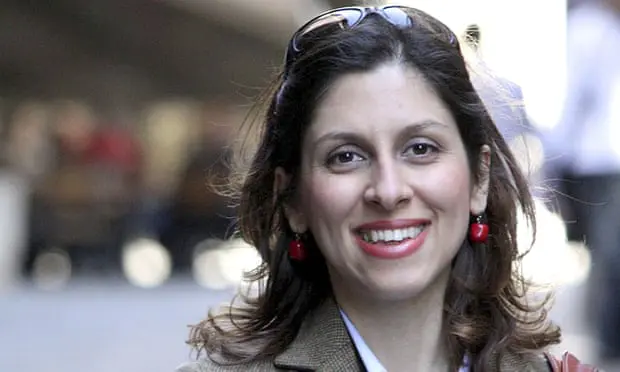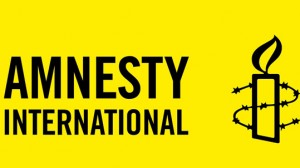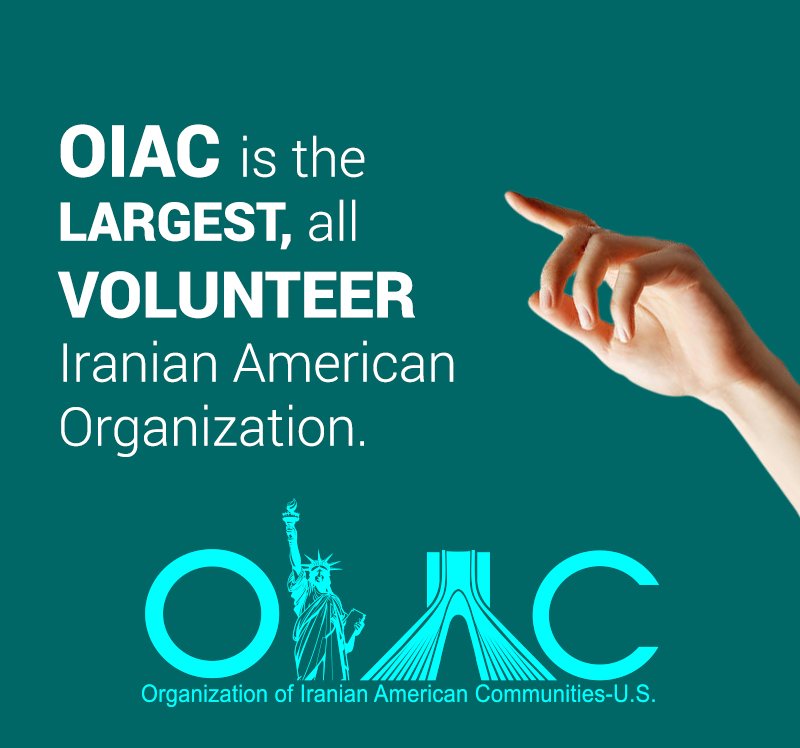Virtual Conference on Iran_May 21, 2020 @ 1 pm (EST)
Join the Virtual Conference on Iran
IRAN: Global Threat, Domestic Repression, Prospects for Change
Tehran’s attempt to exploit COVID-19 pandemic
Thursday, May 21st, 1 pm EST
Iran building new weapons storage at military base in eastern Syria, satellite images show
Fox News, May 12, 2020
JERUSALEM – Iran is building a new tunnel at the Imam Ali military base in Eastern Syria capable of storing advanced weapons systems, according to satellite images and analysis obtained by Fox News
Images captured on May 12 show bulldozers at the entrance of the structure that is estimated to be around 15 feet wide.
Satellite shots from April 1 show an excavator and bulldozers near where the new construction took place.
Intelligence analysis conducted by Image Sat International (ISI), a civilian satellite company, indicates the tunnel is fit to be used for the storage of vehicles carrying advanced weapons systems. This conclusion was drawn from looking at similar tunnels that were dug over the past nine months on the same complex. One such tunnel, two miles away, was bombed in March, forcing the Iranians to abruptly stop construction.
Fox News was first to report the existence of this Iranian military base in September 2019, citing multiple Western intelligence sources. The compound, that sits along the Iraq/Syria border, was targeted with airstrikes less than a week later.The Israeli military has struck numerous Iranian-linked sites in Syria over the past two years, but has not acknowledged recent attacks against the Imam Ali base.
Although reports this month say Israeli defense officials believe Iran is reducing its footprint in Syria, analysts at ISI say the construction of the new tunnel shows Iran plans to continue operating in this area.
Click to read more
5 Iran Tankers Sailing to Venezuela Amid US Pressure Tactics
VOA, May 17, 2020
DUBAI, UNITED ARAB EMIRATES – Five Iranian tankers likely carrying at least $45.5 million worth of gasoline and similar products are now sailing to Venezuela, part of a wider deal between the two U.S.-sanctioned nations amid heightened tensions between Tehran and Washington.
The tankers’ voyage come after Venezuela’s socialist leader Nicolás Maduro already turned to Iran for help in flying in chemicals needed at an aging refinery amid a gasoline shortage, a symptom of the wider economic and political chaos gripping Latin America’s one-time largest oil producer.
For Iran, the tankers represent a way to bring money into its cash-starved Shiite theocracy and put its own pressure on the U.S., which under President Donald Trump has pursued maximalist campaigns against both nations.
But the strategy invites the chance of a renewed confrontation between the Islamic Republic and America both in the Persian Gulf, which saw a series of escalating incidents often involving the oil industry last year, and wider afield. “This is like a new one for everyone,” said Capt. Ranjith Raja, an analyst who tracks oil shipments by sea at the data firm Refinitiv, of the gasoline shipments. “We haven’t seen anything like this before.”
All the vessels involved belong to Iranian state-owned or state-linked companies, flying under the Iranian flag. Since a pressure campaign on Iranian vessels began, notably with the temporary seizure of an Iranian tanker last year by Gibraltar, the country’s ships have been unable to fly flags of convenience of other nations, a common practice in international shipping.
The ships all appear to have been loaded from the Persian Gulf Star Refinery near Bandar Abbas, Iran, which makes gasoline, Raja said. The ships then traveled around the Arabian Peninsula and through the Suez Canal into the Mediterranean Sea, according to data collected from the ship’s Automatic Identification System, or AIS, which acts as a tracking beacon.
One of the vessels, the Clavel, listed its AIS destination as Caracas beginning May 12, according to log data from ship-tracking website MarineTraffic.com. The vessel later changed its destination as “TO ORDER” two days later, though the ship remains on a route that will see it leave the Mediterranean Sea and be in position to sail onto Venezuela.
Click to read more
KHUZESTAN IS IN CRITICAL CONDITIONS; HOSPITALS ARE FILLED WITH PATIENTS AND CORPSES OF THE DEAD
Maryam Rajavi: Our condolences to the people of Khuzestan; I call on young people to rush to the aid of the oppressed people
Maryam-Rajavi.com, May 16, 2020
The situation in Khuzestan is critical and the regime has been forced to shut down 16 cities in this province. Hospitals are filled with people who have been infected, many of whom are in dire conditions. It is said that over the past few days, more than 1,000 people have lost their lives in various cities in this province which is being investigated.
While Khuzestan has been turned into a slaughterhouse for the coronavirus, Rouhani did not even mention it in his remarks today. Instead, he brazenly said, “Since the first day when we encountered this virus, we also faced another danger. I felt this danger through foreign media, and I saw that they want to shut down and wreak havoc in our country with this disease.”
Defending the reopening of businesses and normalization of the situation, Rouhani said religious places will also be opened after the month of Ramadan. He added, “People must be prepared to live with the coronavirus for a few months.”
Maryam Rajavi extended her condolences to the people of Khuzestan. She blamed the mullahs’ Supreme Leader, Ali Khamenei, and the mullahs’ President, Hassan Rouhani, as the main culprits in the dramatic rise in the deaths of the people of Khuzestan. Their inhuman policies have devastated the prolific and oil rich province of Khuzestan and led to the soaring number of infected cases.
Rouhani’s remarks today indicated confusion, mismanagement and chaos within the regime, and also the grim fact that the clerical regime’s leaders do not care the least for the lives and health of the people of Iran. The only thing they care for is preserving their ominous rule.
I call on the nation and particularly the brave young people to rush to the aid of the oppressed people and deprived sectors in Khuzestan and provide them relief.
Click to read more
Many Workers’ Protests in Iran This Week
Iran Focus, May 14, 2020
Despite the current risk of the coronavirus and the ongoing risk of violent suppression by the government, Iranians from various occupations have held protest rallies in several cities across Iran to protest their dire living conditions.Public workers in Kut Abdullah, southwest Iran, held a rally on May 12 to protest delays in their monthly wage payments, but rather than listen to the complaints, authorities sent out security forces to arrest the protesting workers.
Also on May 12, Health Ministry employees in Tehran held a rally outside the Health Ministry building because they had not received personal protective equipment in their fight against the coronavirus and their pensions, bonuses, and overtime pay had not been paid yet.
They said: “We medical staff members are demanding equipment for the hospitals, emergency units, and medical staff members so we can remain protected in order to continue serving the public.”
Meanwhile, locals in Pakdasht, western Iran, protested over not receiving their houses from the government-backed Maskane Mehr project five years after they purchased them. In Tehran on Tuesday, taxi drivers from Khorasan, northeast Iran, held a rally outside the Ministry of Road & Construction to protest their poor living conditions.
On Monday, employees of a counter factory in Qazvin, northwest Iran, held a rally outside the Qazvin Justice Department to protest poor living conditions, their job statuses being unclarified, and months of delay in receiving their paychecks.
One protester said: “Our paychecks have been delayed for nearly 27 months now. And even if these long-delayed paychecks are provided for, we can’t buy much considering the current inflation rate.”
Meanwhile, in Zahedan, southeast Iran, people protested against the destruction of their homes by the authorities after one man sent by local officials said he was working under directives from Tehran.
Also on Monday, in Qom, central Iran, bus drivers, and owners protested over being left in a limbo status by local officials over coronavirus quarantine measures. They demanded government support, including unemployment insurance.
Click to read more
Iran Protests & more




UK rejects plea for ambassador to visit Nazanin Zaghari-Ratcliffe in Iran
The Gaurdian, May 17, 2020
The Foreign Office has rejected a plea from Nazanin Zaghari-Ratcliffe for the British ambassador to Iran to visit her in an act of solidarity before Tehran decides whether to return her to jail.
Zaghari-Ratcliffe’s lawyers told the Foreign Office it was “essential the embassy show her support at a frightening time”. In a letter to the foreign secretary, Dominic Raab, the lawyers described the Foreign Office’s stance as one of “timid inaction and indecision”.
Sentenced to five years in jail in 2016, Zaghari-Ratcliffe has been on furlough at her parent’s home in Tehran since March after a coronavirus outbreak in Iran’s jails. She has been put on a tag and had been hoping that her release would be the first stage to her clemency, but she fears she will be returned to jail for an indefinite period. She contacted the prosecutor’s office at the weekend, as required by the government, and was given no news about her fate.
In the letter to Raab, lawyers for Zaghari-Ratcliffe point out that his predecessor, Jeremy Hunt, had unusually granted her diplomatic protection in March 2019. The lawyers ask what that protection entails if the ambassador, Rob Macaire, refuses her request to see her in her home. It is understood that the Foreign Office believes a visit would be counter-productive.
The letter dated 13 May says a “personal visit from the British ambassador in Tehran is long overdue,” adding that such a move “is entirely appropriate and to be expected for an individual in respect of whom diplomatic protection has been invoked by the UK government, owing in large part to Iran’s abuse of Nazanin’s human rights and denial of the UK’s right to consular visits.”
The lawyers say: “There is also a serious risk that, if this opportunity is squandered and Nazanin is taken back into prison, she will be the target of yet more exploitation and political posturing, including the reinstatement of her second court case and a new sentence of up to five further years of imprisonment.
“As Nazanin told the embassy directly, the UK government must not presume that she will be released once her five-year sentence has been completed. If she is put back in prison at this point, it will signify that she will be held, not for a few more months, but for several more years.”
The letter continues: “She is an innocent British citizen whose rights will be protected by the UK government and whose inhumane treatment at the hands of Iran will no longer be tolerated. You sending your ambassador to visit her after four years’ wait would embody that message.”
Click to read more
IRAN: FEARS OF SECRET EXECUTION MOUNT FOR DISAPPEARED PRISONERS FROM MINORITY GROUPS
Amnesty.Org, May 12, 2020
The Iranian authorities must immediately reveal the truth about the fate and whereabouts of Hossein Silawi, Ali Khasrajiand Naser Khafajian (also reported as Khafaji), three death row prisoners from Iran’s Ahwazi Arab minority, and Hedayat Abdollahpour, a death row prisoner from Iran’s Kurdish minority, Amnesty International said today. The authorities’ refusal to provide the families of the men with information has sparked fears that they are at risk of being tortured or executed in secret.
Hossein Silawi, Ali Khasraji and Naser Khafajian have been forcibly disappeared since 31 March 2020 and Hedayat Abdollahpour since 9 May 2020 after being transferred from their usual places of detention to undisclosed locations.
Their enforced disappearance has taken place amid an apparent rise in the number of executions since April 2020,including in prisons populated by ethnic minorities, which has further heightened concerns about their safety and wellbeing.
Iranian law requires the authorities to inform lawyers of the scheduled execution of their clients 48 hours in advance and grant families the right to visit their loved ones for the last time. In practice, however, the authorities have a long-standing record of secretly executing members of ethnic minority groups after transferring them to unknown locations and refusing to reveal their fate and whereabouts for months or even years.
All four men were sentenced to death following grossly unfair trials and amid serious torture allegations, which have never been investigated. They were denied access to their lawyers and families, as well as to any details of the evidence against them, during the investigation period. According to individuals with direct knowledge of their cases, security and intelligence officials repeatedly pressured them to make self-incriminating statements, which were then used by courts to
issue convictions against them.
Officials’ refusal to provide their families with any information about the men’s fate and whereabouts is cruel and inhuman and amounts to enforced disappearance, which is a crime under international law.
The Iranian authorities must immediately stop inflicting further pain and suffering on the families of these men. They must immediately disclose the whereabouts of Hossein Silawi, Ali Khasraji, Naser Khafajian, and Hedayat Abdollahpour, halt any plans to carry out their executions, and initiate a thorough judicial review of their cases before it is too late.
Click to read more
Commentary:We’re Ready to ‘Snap Back’ Sanctions
If the U.N. doesn’t renew the arms embargo against Iran, the U.S. will use its authority to do so.
The Wall Street Journal, May 13, 2020 by Brian Hook
The 13-year-old arms embargo on the Iranian regime will expire in October. The embargo was created by the United Nations Security Council but is scheduled to end because of the 2015 Iran nuclear deal, leaving the world’s foremost state sponsor of terrorism and anti-Semitism free to import and export combat aircraft, warships, submarines and guided missiles. To prevent this, the Security Council must pass a resolution to extend the arms embargo. Ifthis effort is defeated by a veto, the Trump administration is prepared to exercise all legally available options to extend the embargo.
We face this circumstance because the Obama administration acceded to Iran’s demand that the U.N. embargo end in the fifthyear of the deal. Itis only one of many restrictions on Iran scheduled to expire over time. President Obama hoped concessions would moderate the regime’sbehavior.”Ideally,”he said in 2015, “we would see a situation in which Iran, seeing sanctions reduced, would start …re-entering the world community [and] lessening its provocative activities.”
Instead, Iranian provocations accelerated under the nuclear deal. Emboldened by repeated diplomatic wins and flush with cash, the Iranian regime increased its ballistic-missile testing and missile proliferation to terrorist proxies. Iran built out a “Shiite crescent” in Syria, Iraq, Lebanon, Bahrain and Yemen, arming its proxies to the teeth.
The U.S. and partners have used the arms embargo to disrupt Iran’s sending advanced weaponry to terrorists and militants. This diplomatic tool has rallied the international community to interdict and inspect weapons shipments, building global condemnation of Iranian violations.
Among many examples, on Feb. 9, a U.S. Navy ship interdicted a ship attempting to smuggle Iranian weapons to Houthi rebels in Yemen. American sailors found 150 antitank guided missiles, three surface-to-air missiles, and component parts for unmanned explosive boats.
Iran’s President Hassan Rouhani sees a bright future when the embargo lapses. In November 2019, he said: “When the embargo . ..is lifted next year, we can easily buy and sell weapons.” He went on to hail the provision as a “huge political success” for Iran.
The regime plans to upgrade Iran’s aging air force, improve the accuracy of its missiles, and strengthen its ability to strike ships and shoot down aircraft. Iran’s Islamic Revolutionary Guard Corps-a terrorist group with a long history of targeting and killing Americans- could then reverse-engineer technologies in these systems for domestic weapons production and export.
Click to read more
Donation
501 (c)(3) Tax deductible
Please,
Donate to Organization Of Iranian American Communities
Your donation will help OIAC advocates for a democratic, secular and non-nuclear government in Iran. Founded on the respect for human rights, gender equality, religious and ethnic tolerance, as wells as social, economic justice, and security for America. Our goal is to organize Iranian-American communities in the United States to promote these values.
Thank You,
http://www.oiac-us.com/donation/


